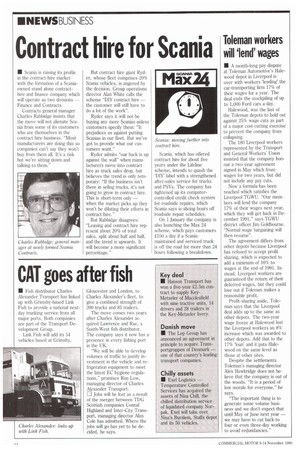Toleman workers will 'lend' wages
Page 14

If you've noticed an error in this article please click here to report it so we can fix it.
• A month-long pay dispute at Toleman Automotive's Halewood depot in Liverpool is over with workers lending' the car-transporting firm 17% of their wages for a year. The deal ends the stockpiling of up to 1,000 Ford cars a day.
Halewood, was the last of the Toleman depots to hold out against 25% wage cuts as part of a major cost-cutting exercise to prevent the company from collapsing.
The 180 Liverpool workers represented by the Transport and General Workers' Union insisted that the company honour a two-year agreement signed in May which froze wages for two years, but did not include any pay cuts.
Now a formula has been reached which satisfies the Liverpool TGWU. "Our members will lend the company 17% of their wages next year, which they will get back in December 1991," says TGWU district officer Jim Goldbourne. "Normal wage bargaining will then resume".
The agreement differs from other depots because Liverpool has refused to accept profit sharing, which is expected to add a minimum of 10% to wages at the end of 1991. Instead, Liverpool workers are guaranteed the return of their deferred wages, but they could lose out if Toleman makes a reasonable profit.
Profit-sharing aside, Toleman says that the Liverpool deal adds up to the same as other depots. The two-year wage freeze at Halewood lost the Liverpool workers an 8% increase which was awarded to other depots. Add that to the 17% loan' and it puts Halewood on the same level as those at other sites.
Despite the settlements Toleman's managing director Alex Hawkridge does not believe that the company is out of the woods. "It is a period of low morale for everyone," he says.
"The important thing is to generate some volume business and we don't expect that until May or June next year — we may have to cut back to four or even three-day working to avoid redundancies."




















































































